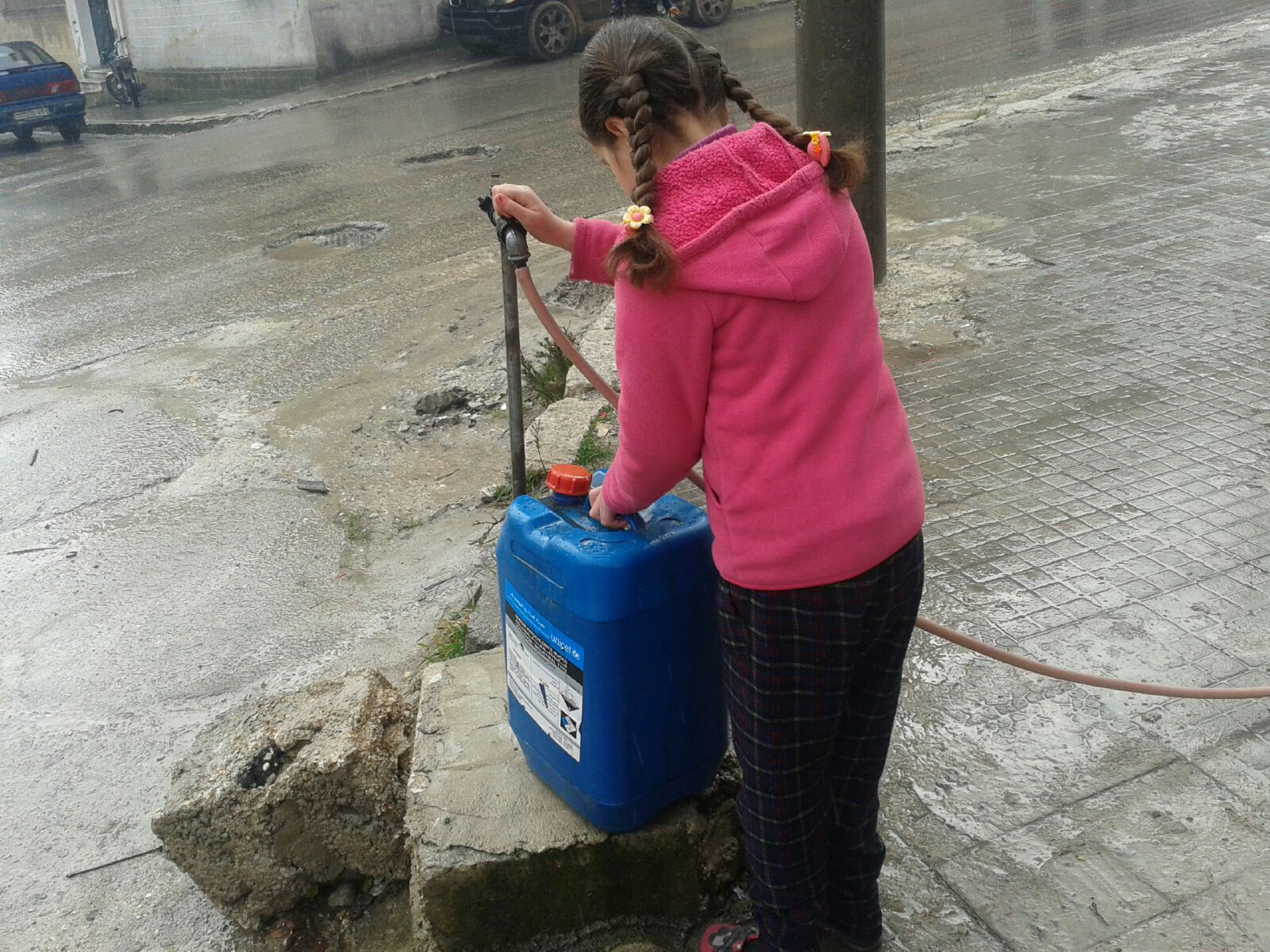Letting Water Flow Back to Idlib

The civil administration of Idlib in northwestern Syria are bringing back water supplies to regions where infrastructure was badly damaged by the fighting.
Idlib’s department for water has been installing taps in the streets for use by the general public, supplied by a number of artesian wells inside the city. The regions two other main water sources are the al-Arshani and the Seijar plants.
Khalid Obaid, the head of Idlib’s department of water, told Damascus Bureau, “Following the liberation of the city, Idlib’s civil administration launched a scheme to restore its water supply network.”

“Subsequently, a number of different aid organisations such as the Violet organisation, Medical Relief for Syria, Goal, and Save the Children began to support the project. With their support, we managed to secure enough funds in May 2015 to buy fuel to operate the well pumps from June to November 2015,” the 35 year-old added.
Obaid explained that Goal had been the main supporter of the project. Between May 2015 and February 2016 the organisation helped repair part of the network, providing spare parts and paying a monthly salary of 300 US dollars to 14 employees.
After the Goal contract expired in February 2016, Idlib’s civil administration took full charge of the scheme and all its associated costs.
“The project expenses come up to 18 million Syrian pounds each month. These costs include providing the al-Arshani and Seijar plants with 3,000 litres of diesel per day, and the monthly wages of plant workers,” Obaid said.
The administration has divided Idlib into a number of areas, each of which receives water from one or other of the plants on a specific day of the week.
There are 14 drivers employed to deliver water to those living in remote areas, charging them half the amount private water tank owners usually demand. The administration is also working on installing a network of street taps in these areas.
Raed is a civil engineer who has worked at the department of water from when it was still under government control. Following the liberation of Idlib, the 40 year-old was appointed to head its laboratory, earning a monthly salary of 400 dollars.
“In June 2015 the city’s civil administration provided the department with funds to reactivate the use of its laboratory. Our work entails ensuring the water is being appropriately tested and purified,” he said.
Raed added that the civil administration was currently paying the wages of around 100 employees.
The renewed water supplies are making a huge difference to local residents.
Lamis, 45, brought her five children to Idlib from Hama in Western Syria, hoping to escape the fighting.
She told Damascus Bureau that she was happy with the basic services available, including water.
One advantage was that the city received a regular supply of free water through street taps, she continued, which saved residents the cost of buying water.
Additionally, running water was pumped to each house for 10 hours every eight days, enabling households to fill up their water tanks for everyday use.
Lamis said the water she stores in her tank usually lasts her family for a week during winter, but during summer they are forced to buy an additional 1,000 litres.
Although Lamis acknowledged that she was luckier than those living in Idlib’s countryside whose only means of obtaining water is to buy it, she still hoped that water would be provided to all Idlib’s households on a more regular basis.
Local officials make sure that noone is siphoning off the water to sell privately.
Tanks and taps were closely monitored, Obeid explained.
“When the department of water installed the network and the street taps, it issued a decree stating that the water was only to be used by the general public as drinking water. Anyone who violated the decree would be punished and fined.
“When [the Islamist militia] Jaish al-Fatah arrived in Idlib they appointed guardians for the tanks and taps to protect them from thieves. One breach happened in September 2015 when a network was attacked. Jaish al-Fath punished the perpetrators and issued them with a fine of 25,000 pounds and a further 50,000 pounds towards [repairing the] damage.”
Maha Rabah is the pseudonym of a Damascus Bureau contributor from Kfar Nabel and a graduate of an IWPR print journalism course.
Read the Arabic version of this article here
